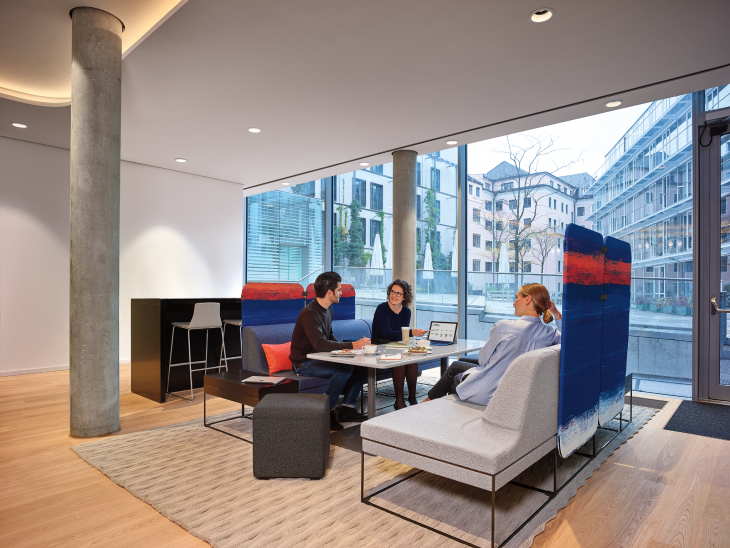Steelcase’s Tracy Brower shares how lessons learned from new entrants to the workplace have helped influence design and the work experience for the success and retention of new employees.
Plato said, “The beginning is the most important part of the work.” There’s something special about the beginning – the beginning of a project, the beginning of a new team effort, and the beginning of a career. Beginnings are important because of the foundation they build, but more than that, because they create the opportunity to look with new eyes. Experience drives familiarity and success, but it also erases the ability to see with naïveté and fresh perspective – both of which are important to discovery.
The new eyes and new perspectives of recent grads who have just entered the workforce can help us see work and work experience in new ways. At Steelcase, we were curious about the experience of new entrants to the workplace. In our study we asked[1] them about their transitions from college to the workforce. We wanted to know, in their transition to the workplace, which were the elements that were most challenging, easiest, and most surprising?
Our lessons learned from these new perspectives help us to consider designing the workplace and the work experience for the success and retention of new employees. But a bigger picture informs our own experiences of work, working, and the workplace. There is so much to see from a novice’s perspective:
Expectations for Flexibility
Surprise:
New employees were surprised by the lack of flexibility they had in their jobs. They struggled moving from college life where ‘anything goes’ as long as they completed their assignments successfully to a role where they were in an office for regular hours. At the same time, they were surprised by how interesting the work was and how many options were open to them on their career path. In terms of their work, they also struggled with the ambiguity of their roles and how little instruction was available, but they loved the freedom of creating work outcomes with plenty of autonomy.
Implication:
Flexibility in how and where work happens isn’t just for new entrants, it is an increasingly typical demand from all generations. In addition, the opportunity for invention and creativity in one’s work is a motivator and inspiration. In both cases, designing workplaces and work experiences where people can work – as much as possible – where and how they wish with high levels of innovation and trust contribute to success.
Relationships in the Work Environment
Surprise:
New college grads entering the workplace were surprised by the importance of relationships. One of the elements of work they found both most challenging and most rewarding was the work they did with others. Of course, they had worked with others in college too, but they had underestimated the importance and the intensity of relationships in their work environment. They had also under appreciated how rewarding the relationships with coworkers could be.
Implication:
Design places where people can come together, build relationships, and get to know each other at both personal and task levels. We work with people every day and we value our colleagues, but from this new perspective, we can be even more conscious of nurturing relationships in our work experience.
The Need for Recognition
Surprise:
Another surprise for recent grads was how much there was to learn. At their graduations, they felt full of knowledge and capability, but in the first years of their new jobs, they felt less capable or prepared. They felt good about their technical expertise and technological comfort, but less confident about their lack of experience.
Implication:
Organizations that were able to provide recognition for small successes fared best in building the capability and performance for new entrants. In addition, when organizations explicitly valued the diversity of new perspectives, new college grads were also able to feel like they could ‘hit the ground running’ more successfully. This applies to all of us, not just new recruits. All employees need to feel valued – like they make a difference. Employees may have varied levels of need for recognition, but every employee needs to feel like their work matters and capable at some level.
Importance of Workplace Culture
Surprise:
Finally, those new to the working world were surprised by how daunting it was to learn an organization’s culture including norms, unwritten rules, and expectations. They also said they were startled by the speed of change and that business moved faster than they anticipated.
Implication:
Organizational culture is, by definition, mostly implicit rather than explicit. Like an iceberg, there are elements on the surface that give clues to the culture (ex. policies or work environment), but much is under the surface. When organizations told stories and linked new employees with a buddy, new entrants to the workplace felt more comfortable and more quickly acclimated to the culture – enhancing their ability to keep up. Likewise, after years with an organization, more experienced employees can take a culture for granted, but an intentional approach to culture can be immensely valuable. Considerations include: teams that discuss their protocols, performance reviews that include a discussion about enhancing cultural fit, or activities that enhance culture through community.
New perspectives on work experience are useful in our learning for the sake of new entrants, but also for the sake of the older guard who have been around a while. Proust advised, “The real voyage of discovery consists not in seeking new lands, but in seeing with new eyes.” And, it’s true that a consciousness about work and a mindset that embraces frequent new beginnings gives us new eyes to see and a renewed ability to create work experiences that are positive for employees at all stages of their work.
[1] Respondents had been in the workforce 1-4 years with an average of 2 years.
Images courtesy of Steelcase






